interviewed by Carl Slaughter
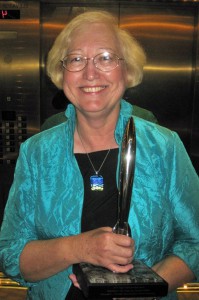 CONNIE WILLIS TALKS ABOUT THE EXTENSIVE RESEARCH SHE DOES FOR HER WRITING, HER INTEREST IN HENRY MENCKEN, HER OPPOSITION FAKE CHANNELERS, HER DISINTEREST IN BECOMING TELEPATHIC, WHAT AUTHORS SHOULD DO AND NOT DO AT CONVENTIONS, AND HER LONGSTANDING, FRIENDLY RIVALRY WITH MIKE RESNICK FOR THE MOST HUGO NOMINATIONS.
CONNIE WILLIS TALKS ABOUT THE EXTENSIVE RESEARCH SHE DOES FOR HER WRITING, HER INTEREST IN HENRY MENCKEN, HER OPPOSITION FAKE CHANNELERS, HER DISINTEREST IN BECOMING TELEPATHIC, WHAT AUTHORS SHOULD DO AND NOT DO AT CONVENTIONS, AND HER LONGSTANDING, FRIENDLY RIVALRY WITH MIKE RESNICK FOR THE MOST HUGO NOMINATIONS.
CARL SLAUGHTER: I can’t say I’ve ever read a short piece of speculative fiction more consistently sophisticated than Inside Job. How long did it take you to write? How many revisions?
CONNIE WILLIS: I rewrite constantly (which is why my novels are always late), and I put in loads of work on every single piece I do. My two-volume novel BLACKOUT/ALL CLEAR took eight years to write, DOOMSDAY BOOK took five, TO SAY NOTHING OF THE DOG four. But that doesn’t tell the whole story. Every story basically takes your whole career to write, both in the skills you acquire and where the stuff comes from that the stories are about. “Inside Job” took a year or so to write, but acquiring the stuff that went into it (including my fascination with Mencken and admiration of him, my hatred of fake psychics and mediums who prey on people to get their money, and my decision to have the heroine be an actress who’s too smart to be in Hollywood) all took years longer.
If you really want to know how long the story took, you’d have to include my reading Postcards from the Edge and all Carrie Fisher’s other books (that’s where I got my too-smart actress from), my reading Inherit the Wind and The Great Scopes Monkey Trial and lots of other books about the Scopes evolution trial which Mencken covered, all of my reading of Mencken’s stuff and biographies about him before I ever decided to write the story, and the original story (about a fundamentalist group who were trying to raise their dead evangelist from the grave in Baltimore and accidentally got Mencken), which led me to go visit Mencken’s grave way back in 1982. That original story never got written, but it’s what led to my writing “Inside Job.” Some famous writer said, when asked how long it took him to write a story, “My entire life,” and that’s pretty much true.
As to revising, I can’t answer the question, “How many revisions?” because I rewrite as I go, rewriting lines and then scenes and then, once the story’s done, the whole thing till it does what I want. I love the scene in Stranger than Fiction where the professor tells Emma Thompson, “You realize that now your ending doesn’t match the rest of the story?” and Emma says, “Yes, so now all I have to do is rewrite the book to match the ending.” That’s pretty much how it is with me. After I write the ending, I have to go back and make the whole thing match.
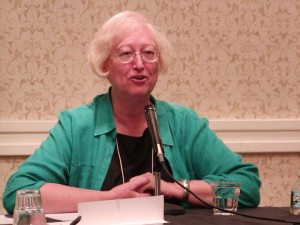 CARL: One of your trademarks is integrating extensive research into your stories. Which topics had you already researched before deciding to write a story about it and which ones did you research specifically for a story?
CARL: One of your trademarks is integrating extensive research into your stories. Which topics had you already researched before deciding to write a story about it and which ones did you research specifically for a story?
CONNIE: I think using the world “research” gives a false impression. I do do research, where I check facts and make sure I’ve got names and dates and locations and details right (what would a little girl in 1348 wear for warmth when she went outside in winter? mittens? a hat? a scarf? and where would a psychic hold an event in Hollywood, stuff like that. But most of the so-called “research” I do is really just the reading and watching of stuff I’m interested in (and/or obsessed with.) I loved H.L. Mencken the moment I laid eyes on him, which was when I read The Great Scopes Monkey Trial and have been reading all his stuff and all about him ever since. I’m also a huge Carrie Fisher fan, and a gigantic skeptic. I read The Skeptical Inquirer for fun (and to get incensed by all the frauds there are out there), not because I needed it for a story.
That’s how most of my stories originate, from the stuff I’m fascinated with–Satchel Paige, Lewis Carroll, the Titanic, the London Blitz. My research doesn’t grow out of my stories, my stories come from them. I was a Fred Astaire fan and had seen all his movies long before I decided to write Remake. People always assume I was also a fan of the Middle Ages, and that that’s why I wrote Doomsday Book, but actually I was a fan of the bubonic plague. I live in the Southwest, where the plague is still around–we get several cases a year, mostly from prairie dogs–and that got me interested in the Black Death and in other pandemics, like the Spanish flu.
I am also a huge fan of Dorothy Sayers, who wrote a classic novel, Nine Tailors, about bell ringers, and I sang in a church choir for years and had to put up with some pretty awful handbell ringers, so I knew all about bellringers, too. But I didn’t know anything about the Middle Ages, except for Chaucer, so I had to do tons of actual research. (And by the way, when researching something you know nothing about, I really recommend children’s books for starters. They give you nice, quick overviews and have lots of pictures, so you can figure out from there what other books you need to read.)
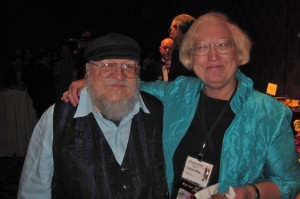 CS: If you’re not already an expert on a topic, how much research time do you typically invest in a story?
CS: If you’re not already an expert on a topic, how much research time do you typically invest in a story?
CW: “Invest” is the wrong word. I know writers who treat it like an investment–someone kindly did an analysis of how much time my stories took and how much I got paid for them, and informed me I should “invest” far less time in them, which is ridiculous. A story should be as good as you can possibly make it, which means it should take as much time as you need to make it that good. As F. Scott Fitzgerald wrote to Hemingway, “I want to be the best writer in the world, don’t you?”
When I wrote Blackout/All Clear, my two-volume novel about time travelers going back to World War II, I read every book I could read about the London Blitz and the Intelligence War and ambulance squads and the evacuated children and the evacuation of Dunkirk. I learned way more stuff than I could put in the book, but in a way it’s all there. Your research should be like an iceberg, with only a small portion showing above the surface and the rest underwater, because if you only research what goes in the book: 1) you don’t know enough to have a feel for the subject, and 2) you’ll never find those telling details that make all the difference to a story. You have to wade through volumes and volumes of stuff to find that one anecdote, that one line, that totally makes your story. Like the fact that H.L. Mencken had an aphasic stroke. Or the story about the bombing raid on Fleet Street during the London Blitz. Fleet Street was home to the newspaper industry, and the raid destroyed pretty much everything. Only one paper managed to get its presses back up and running in time for the morning paper, and its headline read, “Bomb Injured in Fall on Fleet Street.” That story perfectly captures the essence of the British spirit during the Blitz, but I would never have found it if I hadn’t read hundreds of books.
CS: You work the convention circuit a lot. What exactly does an established writer do at conventions? What’s a typical itinerary, what has priority, and what do you hope to accomplish?
CW: It’s true, I’ve been to lots of conventions over my career. I wouldn’t call it exactly working, though. It’s lots of things–a chance to connect with friends, to catch up on what’s going on in the field, a chance to meet your readers and talk to them, as well as the more formal things like doing readings and panels and interviews.
Although it’s certainly true that going to conventions can raise your profile and give you publicity, that’s a long-term goal and it happens in an oblique way, by fans getting to know you and thinking you might be worth reading.
I think it’s a horrible mistake to see it as just an opportunity to try to sell your book. Some writers approach it like that–when they’re on a panel about ANY topic at all, they do an infomercial for their book; they stick all their books in front of them at every opportunity, pass out bookmarks, pencils, etc. and are generally as popular as a salesman buttonholing everyone he meets and trying to get them buy their widget. The panels are the worst: I was actually on one with a bunch of hard-sellers about “How Do You Kill Your Characters?” After a very frustrating half hour trying to get them to talk about anything else besides how wonderful their books were, I said, “Okay, let’s all name our favorite death of a character in literature. I’ll start,” and I talked about King Lear’s death and then handed off the microphone to the first hard-seller, who said (I am not kidding!) “Well, everyone says my killing of my character in my book is the best one ever!” “Better than Shakespeare?” I sputtered. “Yes,” she said. OH, MY GOD!
People go to science fiction conventions to hear great conversations by writers they may or may not have read on interesting topics. They don’t want infomercials! My advice to writers going to cons: be interesting or funny or flamboyant or knowledgeable, and people may very well say, “Wow! They were cool. I think I’ll try one of his or her books!” DO NOT DO INFOMERCIALS.
And also, KNOW something. I’ve been on panels like, “What are your top ten favorite SF short stories?” or “time travel books” or whatever, and once the hard-sellers have listed their story (of course), they’re completely stumped to come up with anything else. Do your research.
And be nice to the other writers on the panel. This is not a “winner takes all” game. People who try to undermine their fellow panel members and make them look bad don’t last long in the field.
And sometimes, if they get on a panel with the wrong person, get a very public comeuppance.
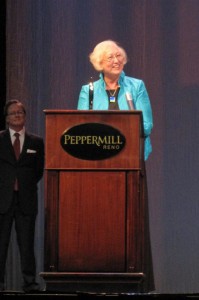 CS: Do you still get rejection letters? Do you still have editors try to tinker with your story? Or is there a stage where an author becomes immune to all that?
CS: Do you still get rejection letters? Do you still have editors try to tinker with your story? Or is there a stage where an author becomes immune to all that?
CW: The only reason I don’t get rejection letters is because I don’t write all that many stories, but of course, I still get edited. I would be very unhappy if I didn’t. Writers CANNOT see their own blind spots–that’s why they’re called blind spots. You’re much too close to your own story, and you were so focused on getting this particular thing to work that you completely forgot some other thing–until an editor says, “But why didn’t they just call the police?”
I work with Sheila Williams at Asimov’s, and she goes over my stories with a fine tooth comb and gives me lots of great suggestions. Ditto my editor at Bantam–I always get pages and pages of notes. My gripe is that lots of editors don’t have much time to give you lots of help–the business is just not structured that way anymore. So most writers end up using their writer’s workshop (which I really recommend) or close friends (not your mother) to do what editors don’t have time to.
My advice for writers: when working with an editor on a book, tell yourself you have fifty points to use when objecting to criticisms and/or refusing to change stuff. Do you really want to waste those points on whether to put a semicolon or a period in a sentence? Or keep a long (and probably boring) passage the editor wants you to cut? Or would you rather save it for the sentence or paragraph that you’re passionately committed to and that you think makes or breaks your story.
I always use the fifty-point thing (it’s less for stories). First I see what all the things I’m willing to do without question are (usually most of the stuff), then move on to the ones I think where I don’t agree with what the editor suggests but think I can do something that will make both of us happy, and finally move on to the non-negotiables. I also try to remember that there are many ways to say the same thing, and that my words are not, in fact, golden. And if that fails, I look at F. Scott Fitzgerald’s manuscripts. He changed everything, all the time. Because he wanted to be the best writer in the world. And came darned close.
CS: You and Mike Resnick have this longstanding, friendly rivalry going over the number of Hugo nominations/wins. Where does the count stand? Who has more nominations? Who has more wins? How often are you nominated the same year? How often have you won when you were both nominated and vice versa?
CW: You’ll have to ask Mike about that. He’s the only one keeping track. But you’re right. It is both a longstanding and friendly rivalry. I’ve seen people who thought we weren’t kidding and that we were enemies who might actually, I don’t know, bludgeon each other to death over a Hugo Award (or with a Hugo Award–they’re pretty heavy), and once, after doing a comic schtick routine with him on a panel, someone came up to me, very worried, and said, “I thought you guys were friends.” We are friends, and our so-called “rivalry” is just something fun that evolved over years of being up against each other on various ballots. But just like using irony, which can be dangerous in the wrong hands, there’s the danger that someone might take you seriously. But it should be obvious from the number of introductions and blurbs and bios I’ve done for Mike just how much I admire him and his work.
I didn’t get to know Mike well, even though we’d been on several panels together, till I was asked to edit a Hugo Awards volume. One of Mike’s Kirinyaga stories was in it, and we talked together quite a bit while the book was being put together. I hadn’t read Mike’s work before (shameful secret–writers don’t read nearly enough of their fellow writers’ stuff), and I was just blown away by how wonderful a piece of writing it was–nuanced, ironic, multi-layered, and beautifully constructed and written. I immediately went and read all his other Kirinyaga stories and then a lot more of his work, and my admiration of him just kept growing. So did our friendship, and one of the most fun parts of it is that he perpetually refers to me as “The Lady Writer from Colorado” and keeps track of our comparative stats.
CS: Last heard you were working on a telepathy novel. How is that going? One of your niches has been time travel. Is telepathy your next niche?
CW: You heard right. In fact, I am still working on my telepathy novel, though I’m very close to being done. It’s a light take on telepathy, partly because there are so many great classics out there, like Robert Silverberg’s Dying Inside and John Wyndham’s The Chrysalids, and partly because I love writing romantic comedy and think telepathy would be absolutely terrible–do we really want to hear what people think? It’s bad enough having to listen to them at Starbucks. People are boring, self-involved, stupid, and apt to obsess over things no one else cares about. Why would we want to listen to them? But if there was a way to connect to your true love and be sure he or she really loved you, you might opt for that. And then, what if you found yourself not connected to your true love, but to someone else entirely, someone you didn’t even like?
I have written lots of time travel stories and novels. I love time travel. I’ve also written about dreams, near-death experiences, signing apes, clones, fads, the movies, Christmas spirits, nuclear war, ghosts, and lots of other stuff. Time travel is my favorite, though, partly because we all wish we could go back in time and see history first-hand and partly because we know it’s the true forbidden country, the one we can never return to. And we all have regrets.
CS: Most memorable convention moments.
CW: Um, let’s see, there are so many. There was the time Sheila Williams and James Patrick Kelly and I nearly got thrown out of the Tupperware Museum in Orlando, and the time we almost got thrown out of the Grand Ole Opry (the new one, not the old one), and the time we got to tour the old Grand Ole Opry, where Hank Williams actually sang. (I’m a huge Hank Williams fan.) And there was a great morning when a bunch of us at a Nebula Awards weekend in New York (Sheila Williams, James Patrick Kelly, Michael Cassutt, and my daughter and I, as I recall) went to the Algonquin Hotel to have breakfast (we couldn’t afford dinner–or lunch) and wish we were as smart and funny and charming as the members of the Algonquin Round Table (Dorothy Parker, Robert Benchley, Harpo Marx, Alexander Woolcott, etc.) were in the 1930s. We weren’t, of course, but there was a huge long line for breakfast, which we stood in for nearly an hour, chattering and having a wonderful time, and we were smart and funny and charming enough that when we finally got seated, they gave us complimentary orange juice for keeping the line so entertained. It wasn’t martinis, but still.
CS: For those who haven’t read it, “Inside Story” is about channeling. If you could channel from the other side, who would be your vessel and what would you say and to whom?
CW: This is the wrong question to ask me. I hate the whole idea of people trying to prey on our wishing they could talk to their dead loved ones or to dead famous people and have written not only “Inside Job” about it, but “Substitution Trick,” “Service for the Burial of the Dead,” and a whole novel, Passage, and I would never inflict being channeled on anyone, even if it were possible, which it’s not.
If, however, I could speak from beyond the grave, I’d say something more than “We are happy here.” Honestly, that’s one way you know it’s all a fake. They always speak in these appalling generalities and platitudes. I would hope I would say something which would be actually useful, like, “The key you’re looking for is in the top right-hand drawer in the kitchen. Next to the sink. No, under the tea towels.”
The other reason it’s the wrong question is because I’m busily writing my messages from the dead right now–in books. Which is what all writers do, isn’t it? Speak to you from other places and other times. And from beyond the grave. I don’t need channelers. I can already hear from Shakespeare and Dickens and Robert A. Heinlein and Dorothy Sayers and Jerome K. Jerome directly.
CS: Advice to aspiring writers.
CW: Read. It’s the single thing that will make your writing better. And read widely–biographies, travel books, history (especially history, which is the raw material of human behavior), humor, the classics, chick lit, Westerns, mysteries, everything. Plus magazines and newspapers and blogs and the backs of cereal boxes and billboards alongside the road.
Also watch stuff. Watch movies and TV series (we’re going through a sort of amazing Renaissance of television shows right now) and soap operas (there are still some) and the news and C-Span and Jon Stewart and old movies. It all adds to the mix in your head that is where your work comes from.
My favorites of the last couple of years: Alan Bennett’s The Uncommon Reader, Joan Didion’s The Year of Living Dangerously, a book (I can’t remember the name) about Mary Anning, who discovered the first ichthyosaur skeleton when she was ten, Alan LeMay’s The Searchers, E.F. Benton’s Mapp and Lucia books, Samuel Delaney’s “The Star Pit,”LouisMcNiece’s “Bagpipe Music,” Dodie Smith’s I Capture the Castle, Shirley Jackson’s We Have Always Lived in the Castle, the TV series Castle, the movies The King’s Speech, Kinky Boots, The Shop Around the Corner, Father Goose, Grabbers, Leap Year, Joss Whedon’s Much Ado about Nothing, and Buster Keaton’s The General.
And of course, my all-time favorites, the British TV series Primeval, the British TV series, Doc Martin, the Syfy miniseries Alice and Tin Man, Larry McMurtry’s Lonesome Dove, Frances Hodgson Burnett’s A Little Princess, Peter Beagle’s A Fine and Private Place, Anthony Trollope’s The Warden, Charles Williams’ All Hallows Eve, and anything with Fred Astaire in it or by Dorothy Sayers, P.G. Wodehouse, Lewis Carroll, Philip K. Dick, Kit Reed, Mark Twain, Nora Ephron, or Shakespeare.

Carl Slaughter is a man of the world. For the last decade, he has traveled the globe as an ESL teacher in 17 countries on 3 continents, collecting souvenir paintings from China, Korea, Thailand, Vietnam, and Egypt, as well as dresses from Egypt, and masks from Kenya, along the way. He spends a ridiculous amount of time and an alarming amount of money in bookstores. He has a large ESL book review website, an exhaustive FAQ about teaching English in China, and a collection of 75 English language newspapers from 15 countries.
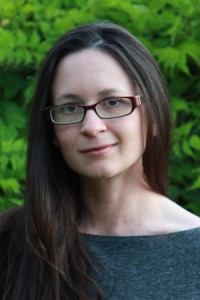 Flash podcast site Toasted Cake was launched in 2012 by speculative fiction author, theater buff, and painting hobbyist Tina Connolly. Toasted Cake recently posted its 100th podcast. Connolly’s first novel, Ironskin, published by Tor, is a fantasy retelling of Jane Eyre and was nominated for the Nebula award. Ironskin was followed by Copperhead. The third in the series, Silverblind, is due in the fall of 2014. Seriously Wicked, a YA novel, is due in the spring of 2015. Connolly’s short stories have appeared in Lightspeed, Beneath Ceaseless Skies, Strange Horizons, and many other magazines. She is a graduate of the 2006 Clarion West workshop.
Flash podcast site Toasted Cake was launched in 2012 by speculative fiction author, theater buff, and painting hobbyist Tina Connolly. Toasted Cake recently posted its 100th podcast. Connolly’s first novel, Ironskin, published by Tor, is a fantasy retelling of Jane Eyre and was nominated for the Nebula award. Ironskin was followed by Copperhead. The third in the series, Silverblind, is due in the fall of 2014. Seriously Wicked, a YA novel, is due in the spring of 2015. Connolly’s short stories have appeared in Lightspeed, Beneath Ceaseless Skies, Strange Horizons, and many other magazines. She is a graduate of the 2006 Clarion West workshop. Carl Slaughter is a man of the world. For the last decade, he has traveled the globe as an ESL teacher in 17 countries on 3 continents, collecting souvenir paintings from China, Korea, Thailand, Vietnam, and Egypt, as well as dresses from Egypt, and masks from Kenya, along the way. He spends a ridiculous amount of time and an alarming amount of money in bookstores. He has a large ESL book review website, an exhaustive FAQ about teaching English in China, and a collection of 75 English language newspapers from 15 countries.
Carl Slaughter is a man of the world. For the last decade, he has traveled the globe as an ESL teacher in 17 countries on 3 continents, collecting souvenir paintings from China, Korea, Thailand, Vietnam, and Egypt, as well as dresses from Egypt, and masks from Kenya, along the way. He spends a ridiculous amount of time and an alarming amount of money in bookstores. He has a large ESL book review website, an exhaustive FAQ about teaching English in China, and a collection of 75 English language newspapers from 15 countries.
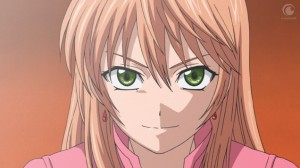 The World is Still Beautiful is based off an ongoing shoujo (girls) manga of the same name. Teenage Princess Nike comes from the small and relatively powerless Duchy of Rain, and in recent years a furious warlord known as the Sun King has conquered most of the known world. In exchange for leaving the Duchy of Rain alone, he asks for one of their princesses to be sent to him as a bride.
The World is Still Beautiful is based off an ongoing shoujo (girls) manga of the same name. Teenage Princess Nike comes from the small and relatively powerless Duchy of Rain, and in recent years a furious warlord known as the Sun King has conquered most of the known world. In exchange for leaving the Duchy of Rain alone, he asks for one of their princesses to be sent to him as a bride. Laurie Tom is a fantasy and science fiction writer based in southern California. Since she was a kid she has considered books, video games, and anime in roughly equal portions to be her primary source of entertainment. Laurie is a previous grand prize winner of
Laurie Tom is a fantasy and science fiction writer based in southern California. Since she was a kid she has considered books, video games, and anime in roughly equal portions to be her primary source of entertainment. Laurie is a previous grand prize winner of 
 CARL: One of your trademarks is integrating extensive research into your stories. Which topics had you already researched before deciding to write a story about it and which ones did you research specifically for a story?
CARL: One of your trademarks is integrating extensive research into your stories. Which topics had you already researched before deciding to write a story about it and which ones did you research specifically for a story? CS: If you’re not already an expert on a topic, how much research time do you typically invest in a story?
CS: If you’re not already an expert on a topic, how much research time do you typically invest in a story? CS: Do you still get rejection letters? Do you still have editors try to tinker with your story? Or is there a stage where an author becomes immune to all that?
CS: Do you still get rejection letters? Do you still have editors try to tinker with your story? Or is there a stage where an author becomes immune to all that?